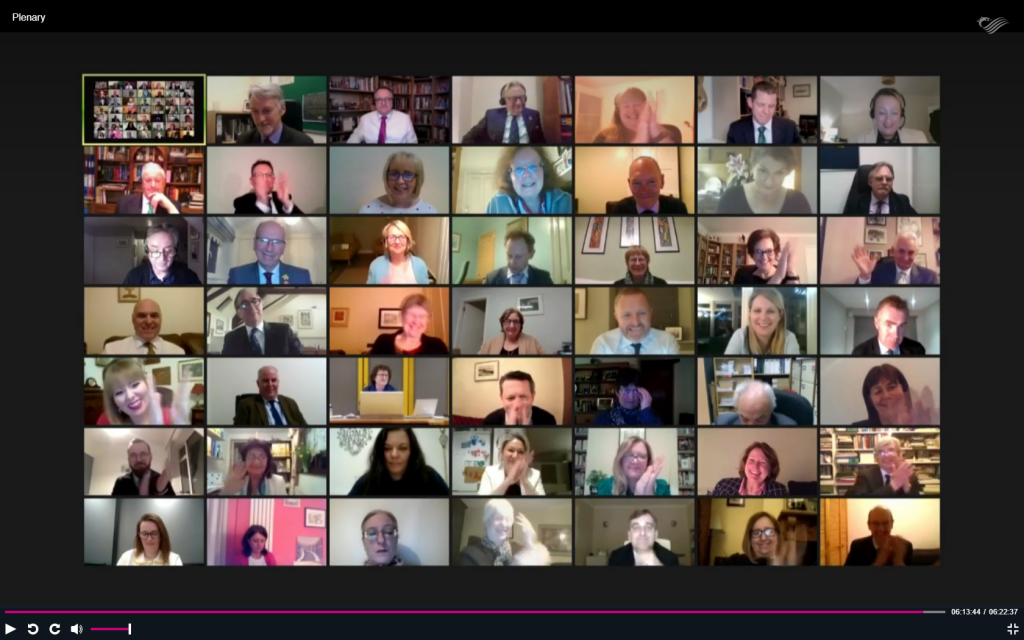TUMULTUOUS SENEDD TERM COMES TO AN END
The afternoon of Wednesday, March 24 saw the end of the fifth term of the Welsh Assembly, now the Senedd (Welsh Parliament). Like the fourth term, it ended with the final vote resulting in an unexpected Government defeat (although this vote had no far-reaching implications). This was followed by heartfelt speeches from the seven MSs who have chosen not to contest the next election. The remainder will contest their seats against new challengers at the May 6 election (see page 6 for details of Cytûn’s election resources)

It has been a turbulent session in many ways. It saw the deaths of 3 of the 60 members elected in 2016 (Mohammad Asghar, Steffan Lewis and Carl Sargeant) and another (Nathan Gill) resigned. 8 members decided to change their party, some more than once, with 2 leaving Plaid Cymru and 6 leaving UKIP. The Brexit Party rose and disappeared within a single term. By the end of the term eight different parties were represented in the Senedd, with three independent members.
Early in the session, the UK, including Wales, voted to leave the European Union. Not only was this controversial – with the vast majority of members of the Senedd having campaigned to remain – but the Senedd’s powers had been established within the legal framework of the European Union. The overhaul of that framework is unfinished at the end of term, with the implications of the changes to the Senedd’s powers in the UK Internal Market Act 2020 as yet untested, and being legally challenged by the current Welsh Government. The next Senedd will need to legislate with regard to agriculture, fisheries and the environment to establish new post-Brexit arrangements for Wales.
The end of this Senedd term came a day after the anniversary of the introduction of a lockdown to try to stop the spread of the coronavirus in Wales. As well as all the implications for individuals, families, churches and society as a whole, the Senedd was found to have powers that few had previously dreamed of to restrict the freedom of individuals and society under the Public Health Act 1984 and to control all aspects of life. It became clear that the circumstances allowed the Senedd to control matters such as arrangements for immigration from outside the UK and travel across the border with England, which are not devolved. It is no wonder that the issue of Wales’ relationship with the United Kingdom became a topic of discussion during the pandemic year.
Covid has slowed the process of passing new laws, but a number of laws that will affect Wales for a generation have been passed, including:
• The Curriculum and Assessment (Wales) Act 2021 and the Additional Learning Needs and Education Tribunal (Wales) Act 2018 which are transforming what is taught to all school pupils in Wales, with a new curriculum framework due to roll out from September 2022.
• The Children (Abolition of Defence of Reasonable Punishment) (Wales) Act 2020 which prevents physical punishment of children from April 2022.
• The Public Health (Minimum Price for Alcohol) (Wales) Act 2018 which sets a minimum of 50p per unit for alcohol.
• The Public Health (Wales) Act 2017 which prohibits smoking in a range of public places.
• The Senedd and Elections (Wales) Act 2020 which gave 16 and 17 year olds and citizens from other countries the right to vote in the May 6 Parliamentary election on 20 May, and the Local Government and Elections (Wales) Act 2021 which extends the same rights to local elections from May 2022.
On the other hand, it proved impossible throughout this term to implement the Renting Homes (Wales) Act 2016 – passed by the previous Assembly – and we will have to wait until at least April 2022 to see it in action. When that happens, the whole system of renting houses from private landlords (including churches) will change in Wales.
Throughout, Cytûn has sought to ensure that the interests of the churches of Wales were considered (for example, the requirements of churches who provide housing for their ministers under the new legal system for renting) and also that a Christian voice could be heard regarding the moral and social issues that arise from new legislation and the implementation of existing laws. On some issues (such as the punishment of children) we know that our churches and their members are not unanimous in their views, but we have tried to help the Welsh Government and Senedd understand the range of views held amongst us. Where we were able to work with other faith communities – Christian and others – we did so, as also with other third sector organizations. During the Covid year the Faith Communities Forum and the Third Sector Partnership Council became even more important in engaging with the Welsh Government about the various changes to the regulations, and Cytûn represents our members on these two key fora.
LEGISLATING FOR A NET ZERO WALES BY 2050
Amongst the large amount of secondary legislation passed in the final weeks of the Senedd was a series of regulations to reduce Wales’ net carbon emissions to zero by 2050, with a legal obligation to achieve at least a 63% reduction (compared to 1990) by 2030 and a reduction of at least 89% by 2040. These goals will not be easily achieved – though measures such as carbon capture and storage in forests or by technological means can be taken into account in the calculation.
The commitments of every country in the world will be considered at the international COP26 summit to be held in Glasgow in November 2021. Cytûn represents our member churches and organizations within two coalitions working to explain the importance of this conference and encouraging individuals, churches and society as a whole to take up the challenge – while recognizing that the ability to take the biggest steps lies in the hands of world governments.

Climate.Cymru is a coalition of voluntary organizations in Wales that aims to raise the voice of at least 50,000 people in Wales at the summit. You can add your voice by following the link above to the website.

Climate Sunday is a coalition of Christian churches and organizations throughout Britain and Ireland that encourages local congregations of all Christian traditions to hold a service based on the climate theme; commit to playing their part as a congregation through the EcoChurch or LiveSimply schemes; and speak out by signing the Climate Coalition declaration for a healthy, greener, fairer tomorrow – stating that you do so on the basis of your faith. There are extensive resources for your service – or indeed more than one service – in English and Welsh on the Climate Sunday website.
Project launched to help older people in Wales stay connected

Age Cymru has launched HOPE (Helping others participate and engage) to help older people (50+) and carers be supported and able to live their lives to the fullest. The Project is a partnership between Age Cymru, Age Cymru local partners and Age Connects Wales partners throughout Wales. HOPE is funded by Welsh Government under the Sustainable Social Services Grant until the end of March 2023.
HOPE will help people with getting information and support with issues including housing, accessing services, dealing with loneliness and isolation and getting financial help and other entitlements they may need or benefit from. Alongside this, it will help older people to take part in community activities, understand their rights, engage with professionals and have their voices heard. We know that the current COVID-19 pandemic will have had a big impact on the lives of older people so they might need more support than ever to reengage with their communities and to get access to services as restrictions are lifted.
HOPE staff and volunteers will also engage with communities who can guide us to make sure the service we provide is right for the needs of older people and carers in their areas. We’ll develop forums to support us to do this or work with existing ones. We don’t want to duplicate services but rather make sure we work with and complement existing advocacy providers and fora across Wales. Churches, which already provide much valuable support to older people in their communities, will benefit from being able to refer people to the new advocacy service.
HOPE will establish a programme of training, workshops and events enabling advocates across Wales to develop their skills and knowledge. Training and workshops will also be available to other professionals who would benefit from greater awareness of advocacy and how to access it.
The project is currently recruiting and training community-based volunteers to provide independent advocacy support to local older people and carers, allowing them to shape the key decisions affecting their lives and avoid getting into crisis situations. If you’re interested in becoming a volunteer advocate with HOPE please contact Bryony Darke (Volunteer Coordinator) bryony.darke@agecymru.org.uk or go to the website: www.agecymru.org.uk/advocacy
Second Round for the Cultural Recovery Fund
The Welsh Government has announced a second round of Cultural Recovery Fund grants to help support the cultural sector. The aim is to protect sustainable businesses and organisations and as many jobs as possible in order to ensure that the cultural sector survives the Covid-19 crisis and remains vibrant, viable and sustainable in 2021 and beyond. The sector includes theatres, music venues, recording and rehearsal spaces, heritage attractions and organisations, museums, libraries, galleries, archives, independent cinemas, comedy venues and events.
The funding is to cover the period from 1 April 2021 to 30 September 2021. The Fund will be open for applications from the week beginning 6 April and close on 20 April. A number of Christian organisations are likely to be eligible. You can find here more information about the fund and assess whether your organisation is eligible to apply.
BYW NAWR BECOMES COMPASSIONATE CYMRU
John Moss writes…

I’ve recently been appointed as the Macmillan Compassionate Cymru Strategic programme manager, working closely with Lesley Bethell, chair of Compassionate Cymru, and our developing team including Cath Thompson and Kimberley Jones.
The original purpose of Byw Nawr, established by the late Dr Hywel Francis MP, was to generate a national conversation about how we can live well, yet make preparations in advance for the end of life and the movement has delivered many notable achievements throughout its time. However, the attention of the group focused more and more on the compassionate communities approach and when the Compassionate Cymru Charter was signed off by Welsh Ministers in 2020, the time seemed right to move from Byw Nawr and focus efforts entirely on delivering a Compassionate Cymru.
The ambition, reach and scope of the programme is immense and exciting and involves working with a large number of partners and organisations, including Welsh Government, Health Boards, and third sector organisations. This work is given a context by the Compassionate Country Charter and rooted in communities and in the individuals, families and organisations that comprise them.
It focuses primarily on those members of our communities who are at the end of their lives, or caring for those at the end of their lives at any age, including children and their families. We also want to support those who are lonely and isolated at any age and we want to bring people together with those who are members of their communities and willing and able to support each other. Our initial projects are focussed around supporting hospital to home pathways and providing neighbourhood support and working to ensure no-one in Wales dies alone.
I’m really looking forward to working with you all to make these connections so that we can work together to deliver a Compassionate Cymru.
Gethin Rhys adds…
I represent Cytûn and our member churches on the Compassionate Cymru Steering Group – and the Compassionate Cymru charter refers explicitly to places of worship.
I will be co-ordinating a churches’ response to the Welsh Government’s Draft National Framework for the Delivery of Bereavement Care in Wales, issued at the end of the Senedd term. I would welcome contributions to our response – these need not be long essays about policy approaches, but can be based on the experiences of your congregation, denomination or organisation. In order to get our response to the new Welsh Government by the closing date of May 17, I would be glad to hear from you by May 10 at gethin@cytun.cymru
New arrangements for the registration of marriages
The Law Commission is currently considering the responses to a consultation on weddings law in England and Wales held in 2020. In the meantime, the UK Government has introduced to the Westminster Parliament The Registration of Marriages Regulations 2021 to implement the changes to the arrangements for registering marriages included in The Civil Partnerships, Marriages and Deaths (Registration etc.) Act 2019.
This will change some of the responsibilities of ministers and authorised persons with regard to registering marriages from May 4 2021. The House of Commons Library has produced a summary of the changes, and the Law & Religion blog has published useful summaries of the information for clergy and information for authorised persons from the General Register Office.
There are also changes to the requirements for overseas citizens who wish to marry, following the UK’s departure from the European Union, and information about this can be found on gov.uk
Churches call for protecting Britain’s International Development
In November 2020, the UK Chancellor announced the Government’s intention to significantly reduce the budget for international development, arguing that the costs of dealing with the coronavirus pandemic meant a temporary cut was necessary.
Under the Government’s plans, overseas aid spending will be reduced from 0.7 per cent to 0.5 per cent of Gross National Income (GNI). It would mean the international development budget falling by around a third, from £15.2 billion in 2019 to around £10 billion in 2021. The 0.7 per cent target had been met every year since 2013, and enshrined in law since 2015.
Senior leaders and representatives from the UK’s Churches, including several member churches of Cytûn, have criticised this move in strong terms:
Cardinal Vincent Nichols, Archbishop of Westminster, said “A clear measure of a nation’s greatness is the manner in which it responds to the needs of its poorest. The same is true for the response to poverty between nations. If we truly wish to be a great nation, then cutting the overseas aid budget is a retrograde step.”
The Church in Wales said, “The UK government’s commitment to spend 0.7% of Gross National Income on international development… has given the UK much to be proud of as a player on the international stage, showing our solidarity with other nations, recognising our inter-connectedness as a global community, and providing us with a strong platform from which to encourage global responsibility in others. It is not acceptable to say that because people in the UK are suffering the economic effects of the pandemic, more suffering should be visited upon others.”
Revd Richard Teal & Mrs Carolyn Lawrence, President & Vice-President of the Methodist Conference, said “Times are tough for many of us, both here in the UK, and for our brothers and sisters across the globe. The UK aid commitment is a percentage of the UK’s income – and so it changes each year, and is never beyond what we as a nation can afford.”
With a calling to love our neighbours, a commitment to working for justice, and many global connections, for many decades Churches have championed international efforts around human development and global poverty reduction. The 0.7 per cent target has its origins in an initiative of the World Council of Churches in 1958, before being adopted by the United Nations in 1970.
In the UK, Churches and Christians have played a significant role in calling for Britain to support international development and fulfil its global responsibilities in relation to aid, trade, debt and climate, through campaigns such as Jubilee 2000 and Make Poverty History. Many of the major British international development agencies such as Christian Aid, CAFOD, Tearfund and World Vision have their roots in the churches.
The global pandemic is the biggest humanitarian crisis in a generation, and has pushed an estimated 150 million people worldwide into extreme poverty. At this crucial time, churches believes that more international assistance is needed, not less. The UK’s commitment to 0.7 per cent has been a catalyst for a step-change in global efforts to support development. The UK has been influential in pushing its peers to commit to more and better aid – but will now drop behind them. In a year when the UK will host the G7 and UN Climate Summits, and the government is seeking to establish a role and vision for a post-Brexit ‘Global Britain’, we should be showing leadership through our continued commitment to international development.
In an age of global interdependence, helping to build safer, fairer, healthier societies where all can thrive is in everyone’s interests. In relation to Covid-19, only when people and countries around the world are free of the virus will lifting the restrictions on our lives be possible. Other contemporary challenges which affect Britain, such as climate change, migration and conflict, will only be effectively addressed through international action.
Church members are being urged to write to their MP in Westminster to express their views.
A shortened version of a briefing paper published by Churches Together in Britain and Ireland.
ELECTION DAY CONFIRMED FOR MAY 6 2021

On March 9, the Governments of the UK, Wales and Scotland confirmed that the elections scheduled for May 6 will be held as scheduled, with some special arrangements due to the Covid-19 pandemic – including making it easier to vote by post. In Wales, voters will elect 60 members to the Senedd (Welsh Parliament) and four Police and Crime Commissioners (PCCs), one for each police force in Wales.
Cytûn is part of a partnership of churches across the UK that has prepared resources to help individual churches and Christians think and pray as they prepare to vote. Materials include information about the electoral and voting systems and a special prayer for election time. There is also impartial information about some of the key policy areas, including the new curriculum for schools in Wales; social care; poverty in Wales; immigration, asylum and black and minority ethnic people; a just and green recovery following the pandemic; and policing and crime issues. The material for Wales, together with equivalent material for the Scottish Parliament and local government elections in England, are available also at: jointpublicissues.org.uk/elections
Cytûn is also part of a partnership with Evangelical Alliance Wales, the Welsh Centre for International Affairs (WCIA) and the Ethnic Minority and Youth Support Team Wales (EYST) to hold an online question and answer session with Siân Gwenllian (Plaid Cymru), Jeremy Miles (Welsh Labour) and Mia Rees (Welsh Conservatives) on Wednesday April 14 at 6.30-8pm. It will be chaired by the Very Revd Dr Sarah Rowland-Jones, Dean of St David’s. Book online here.
Cytûn has published guidance for local groups wishing to hold similar meetings for their constituencies or regions. We can publicise such meetings – send details to gethin@cytun.cymru
GETHIN ABRAHAM-WILLIAMS MEMORIAL LECTURE
Following his sabbatical periods during 2020 studying climate change, Cytûn’s Policy Officer, Rev. Gethin Rhys, has been invited to deliver the Gethin Abraham-Williams Memorial Lecture on Thursday May 20 at 5-6.30pm. This lecture will be held online.
The title of the lecture is The End of the World? Christian apocalyptic and responses to climate change. It will be delivered bilingually, with simultaneous translation from Welsh to English, and there will be an opportunity to ask questions at the end. Book online here.
Cytûn – Churches Together in Wales
Room 3.3, Hastings House, Fitzalan Court (opposite Brunel House), Cardiff CF24 0BL
Office tel: 03300 169860
E-mail: post@cytun.cymru www.cytun.co.uk
Twitter @CytunNew
